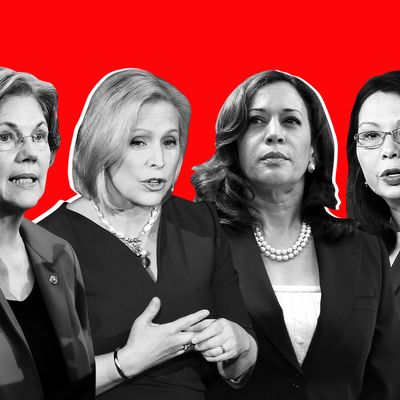
Last June, Senator Kamala Harris used a televised hearing of the Senate Intelligence Committee to mercilessly dismantle Jeff Sessions, the attorney general. Sessions told the committee he could not answer any questions about President Trump, citing a vague “policy.” Using the rapid-fire questioning method she had honed as a prosecutor, Harris forced Sessions to admit he could not describe the policy in any specificity and didn’t even know if it was written down. At several points, Harris so flustered her prey that his former Republican Senate colleagues came to his defense, asking that he be given more time to answer her chain of queries.
I found Harris’s performance highly compelling, not only as a demonstration of effective legislative oversight, but also as a set piece of political theater for a potential presidential candidate in 2020 or beyond. Many liberals took away from the episode something different. The dominant focus of their commentary was the fact that Republican senators interrupted her in order to give Sessions more time to answer her questions. The men-interrupting-women theme fell into a familiar source of social media umbrage. And those reactions, initially registered on social media, formed the basis for much of the coverage that followed. News reports of the hearing produced headlines like “Once Again, Kamala Harris Is Interrupted at a Senate Hearing” (Huffington Post) and “Kamala Harris Is (Again) Interrupted While Pressing a Senate Witness” (New York Times.)
These headlines are not descriptions of Harris’s commanding testimony, or anything she did. They are descriptions of things that were done to her. And while the intent of the people expressing outrage at the interruptions was sympathetic, it probably was not helpful to Harris, or to her political goals. It removed Harris of her agency, and reduced her to the status of victim. This illustrates the degree to which left-wing political discourse can paradoxically have a harmful effect on women who are trying to break political barriers.
A second illustration of this dynamic occurred more recently. GQ published a profile of Kirsten Gillibrand, headlined, “Kirsten Gillibrand, the Senator From the State of #MeToo.” Much of the story followed this theme, describing not only Gillibrand’s leadership on the issue of sexual harassment, but her status as actual victim of harassment. It describes in detail inappropriate comments male Senators made about her body, and innuendo-laden comments directed at her on Twitter by President Trump (he “basically just called me a prostitute,” she told colleagues.)
Gillibrand, like Harris, is a shrewd and talented politician and a first-tier presidential candidate. Whether putatively favorable coverage that presents her as the subject of male abuse actually advances her goals is a very open question.
Any politician faces a certain plausibility hurdle in getting the public to see them as a figure of presidential stature. That barrier is probably higher for women than men, and especially so for younger women. Presenting a female politician as a victim may attract support and positive attention among progressive activists. On the left, victimhood is a prime source of authority, and discourse revolves around establishing one’s intersectional credentials and detailing stories of mistreatment that reinforce them. Within the ecosystem of the left, demonstrating that you have suffered harassment or microaggressions is a big win. But among the country as a whole, the dynamic is very different.
“I don’t begrudge organizations or officials who came to their defense,” Jennifer Lawless, a professor of government and the director of the Women & Politics Institute at American University told me. But, on the other hand, “Voters don’t want to be in a position where they’re being asked to vote for somebody who needs to be taken care of.”
Leonie Huddy, a Stony Brook professor of political science who has also written extensively about the challenges facing female candidates, also suggested that a heavy emphasis on a politicians’ suffering might undercut their ability to project an image of strength and competence:
Sexual harassment is about power relations and any claim that a politician has been sexually harassed will make them look weak regardless of their gender. But this may be worse for women than men. Trump’s sexual innuendos about Gillibrand’s willingness “to do anything” and “begging” for campaign funds portrays her as weak and powerless (certainly less powerful than Trump). This reinforces gender stereotypes of women as less powerful and assertive than men. Media stories that condemn Trump’s comment about Gillibrand still replay his original claim which is hard for voters to completely forget. The news stories refute sexism but they have the unfortunate effect simultaneously of reinforcing it by evoking an image of a weak female political leader.
These reactions are complicated by political partisanship and feminist beliefs. Nonetheless, the question is whether describing a woman politician as a victim of harassment or discrimination will subtly shape and reinforce views of her as weak even among partisans of her own party.
None of this is to say the correct course of action is obvious or easy. If it were easy, we would probably have had a female president already. Playing to the most popular tropes in progressive circles on social media is a seductive way for Democratic female candidates to capture attention from activists. It may not be their straightest path to the White House.






























